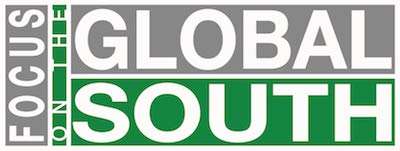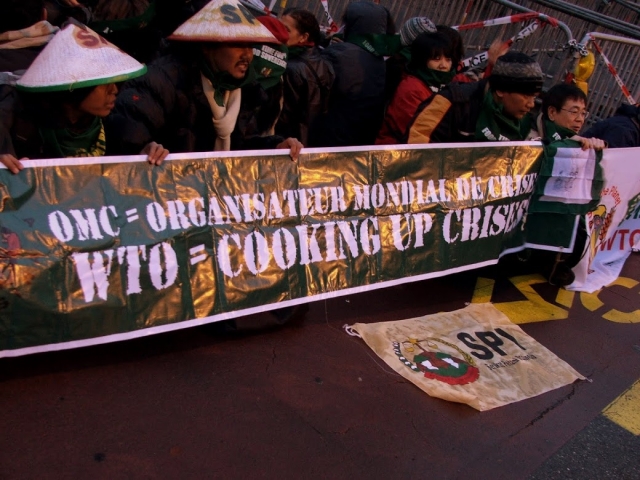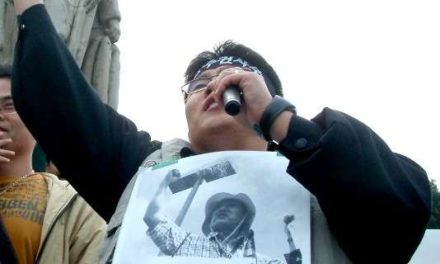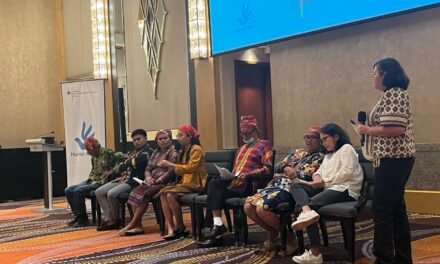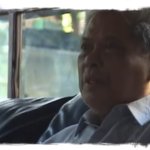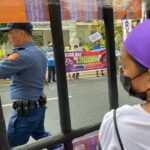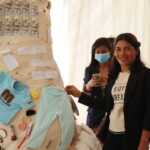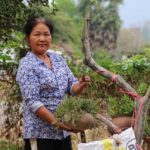The Doha Development Round, also called the Doha Development Agenda (DDA), is the current trade-negotiation round of the WTO. It has now reached its thirteenth year since it started during the Fourth Ministerial-level meeting in Doha, Qatar in November 2001 with the objective of lowering trade barriers globally to help facilitate the increase of global trade. Succeeding ministerial meetings took place in Cancun, Mexico in 2003, and Hong Kong in 2005. Related negotiations took place in Paris, France (also in 2005), Potsdam, Germany in 2007, and Geneva, Switzerland in 2004, 2006, and 2008.
From the time when this round commenced in 2001, the negotiations have been characterized by persistent differences among the United States (U.S.), the European Union (EU), and developing countries on major issues, and have already suffered two breakdowns. The first one was during the Cancun Ministerial Meeting in September 2003, and the second in Potsdam in June 2007. Since 2008, the negotiation has been deadlocked due to differences in positions on major issues between members of developed countries led by the EU, the U.S., and Japan, and the developing countries represented by India, Brazil, China, South Korea and South Africa. The most pressing of these divisions are on agriculture, industrial tariffs and non-tariff barriers, services and trade remedies.
The framework of the WTO favors rich countries as it systematically supports the interests of multinational corporations. The economies of poor countries, which have less negotiating power against the big trading countries, normally suffers from the damaging impacts of the current unfair trading system.
A development round that offers no kind of development to the poor
The Doha Development Round was named as such to entice developing countries to participate in it. After feeling the impacts of the Uruguay Round, developing countries realized that they had collectively given away too much and relinquished their possibilities for development when they agreed to the content of the 500-page document that they signed in 1994. The Uruguay Round was the eighth Round of multilateral trade negotiations conducted under the framework of the General Agreement on Tariffs and Trade (GATT). It covered the period from 1986 to 1994 and led to the creation of the WTO. Viewed as the largest negotiation of any kind in history, it carried a broad mandate to extend the GATT trade rules to areas that had been previously exempted and too difficult to liberalize such as agriculture and textiles, as well as new areas that were becoming increasingly important but not previously included such as trade in services, intellectual property, and investment policy trade distortions.
To alleviate the impacts of previous agreements, developing countries (including emerging economic powerhouses such as China, Brazil, and India) have been demanding the reduction of agriculture tariffs and subsidies among developed countries, non-reciprocal market access for manufacturing sectors, and protection for their services industries.The United States, the European Union, and other developed countries, on the other hand, want increased access to developing countries’ industrial and services sectors while asserting to retain some measure of protection for their agricultural sectors. Since both sides have refused to resolve these differences, the WTO has so far failed to reach a comprehensive agreement.
Prior to the first collapse of the negotiation in Cancun, developed countries had pushed for another round of trade liberalization during theThird Ministerial of the WTO inSeattle in November 1999. Massive protests by farmers, workers, environmentalists, alter and anti-globalist movements combined with the “rebellion” of developing countries against the increasingly frustrating negotiation resulted in a spectacular collapse of the talks that year[1]. The historic global protest is now immortalized in the film “Battle in Seattle”.
The yearafter, developing countries were subjected to tremendous pressure in Doha to agree to the launching of a new round in order to “save” the global economy. Much arm-twisting and threats of retaliation for “non-cooperation” in Seattle coupled with offers of massive aid packages to the “recalcitrant” developing countries took place. The notorious tactic of excluding most of the developing countries from decision-making was also at play. Many developing countries complained of secret meetings that were effectively confined to a select group of about 30 to 35 governments handpicked by the EU and U.S. This underhanded trade diplomacy resulted in the Doha Development Round, which many pointed out had little to do with development and everything to do with expanding developed countries’ access to developing country markets[2].
As its name implies, the Doha Round was supposed to produce development-friendly outcomes, instead it pressured developing countries towards creating comprehensive market access for transnational companies from rich countries by liberalizing their agricultural, industrial, and services sectors. Agriculture has become the linchpin of the Doha Development Agenda. The U.S. and EU are commonly criticized by developing countries for their domestic agricultural spending support for American and European farmers, which hurt the economies of low-income countries.
In addition to concessions on agriculture, some of the most important issues to developing countries include compulsory licensing of medicines and patent protection, trade facilitation through harmonization and streamlining customs procedures, and differential treatment of developing countries. Developing countries also want their problems in implementing current trade obligations addressed. The round is also being increasingly criticized now for the destructive impacts on labor and the environment of liberalized trade and investment. Social, economic, and environmental issues have increased as poor countries continue to lose their capacity to protect their economic interests[3].
[1] Walden Bello, “The Meaning of Seattle: Truth Only Becomes True Through Action”, Yes Magazine, 28 November 2009, posted in http://focusweb.org/node/1550
[2]FatoumataJamara and Eileen Kwa, 2004, Behind the Scenes at the WTO: The Real World of International Trade Negotiations, Updated Edition, Zed Books
[3]See The Statement of the Climate Space of the World Social Forum in Tunis, “To Confront the Climate Emergency We Need to Dismantle the WTO and the Free Trade Regime”, 05 September 2013 http://focusweb.org/content/confront-climate-emergency-we-need-dismantle-wto-and-free-trade-regime
